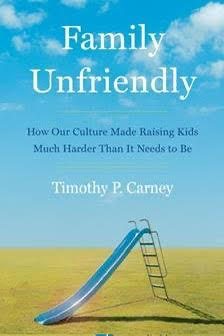This post was last updated on May 6th, 2024 at 08:30 pm
Many parents feel like they have little choice over whether to give their teenager a smartphone. If they don’t, they fear, their child will somehow lose important social connections. Timothy Carney, a father of six children, believes parents should be more concerned about the problems that these devices can create. That’s why he and his wife haven’t given smartphones to their kids, including their 17-year-old daughter.
Carney and his wife, Katie, are fortunate in that their 17-year-old, who is also their oldest child, has embraced a smartphone-free lifestyle. She attends a Catholic school, where many of her peers also don’t use the device. The school itself prohibits their use during the school day. And while their daughter did ask for a smartphone, she didn’t insist on it.
“She’s never pressured us for a smartphone, in part because she hears us talking a lot about how we feel it’s destructive,” Carney told me during a recent interview. His daughter uses a dumbphone instead.
While Carney is humble about it, raising six kids in mainstream America without giving any of them smartphones requires a significant commitment. It’s not as simple as telling a child that they cannot have this device, which many parents and their kids believe has become indispensable. The device serves not only as a communication tool but has become our culture’s main reference point. Living without this device requires living differently than one’s peers. No easy task for a teen.
How smartphones complicate parenting
Carney, who is a columnist at the Washington Examiner and a senior fellow at the American Enterprise Institute, is not anti-technology, to be clear. He does use a smartphone himself (and, as he admits, sometimes too much). Rather, he believes withholding smartphones from kids is about protecting the family structure. Carney recently wrote a book, “Family Unfriendly,” about why it’s become so difficult to raise a family in the U.S. The emergence of smartphones and their addictive apps is one of several reasons why parenting has become such a struggle, he argues.

In his book, Carney describes how introducing social media to “your children’s lives is like bringing a flatbed full of kudzu into your garden. The good things Mom and Dad have tried to cultivate will be wiped out, and the algorithms and influencers will seed their own style, lingo, fad, ethics, and anthropology.”
Social media can quickly undermine the hard work that parents invest in shaping their children’s perspective of community and family. “Skilled parents can teach kids self-control and discernment to help give them control over the devices and the medium, but it’s tough. This is a brave new world of technological stimulation that no previous generations have test-driven,” he explains.
The solution is simple but requires a strong support system
The obvious solution is to not give smartphones to kids, especially teenage girls who tend to be also among the most vulnerable to social media’s toxic messaging and addictive design. That the Carney family has been able to raise a 17-year-old daughter without giving her a smartphone is one of Carney’s most inspiring messages.
Carney shared with me a story about how his daughter at a cookie-making party noticed that many of her friends were not only posting photos to Instagram of the cookies they made. They were also scrolling and looking at other people’s posts. So she collected everyone’s phone and put the phones by the front door and suggested, “How about we post it to Instagram after the party?”
Wow.
While social media poses the biggest danger for girls, the big danger for boys is pornography, Carney noted. “The groundwork that needs to be laid for that has to be healthy conversations, between father and son, about sexuality. That can’t be something that’s done in the same conversation as ‘I’m not going to give you a smartphone,’” Carney said. “That conversation has to be ongoing, sort of the groundwork that builds up to the question of the smartphone.”
To raise a smartphone-free child, you need to have a strong support system, Carney explained. Communication with the parents of your child’s friends is also important. With six kids, the Carney family has practice broaching the topic with other families. Carney encourages these parents to join his family in holding off on giving their child a smartphone. “If you want to talk about it, we can tell you why we think it’s a mistake,” Carney tells them.
So if your child claims that “everybody” has a smartphone, you now know that’s not true. Timothy Carney’s kids don’t carry these devices. (For that matter, neither do our family’s kids.)
Read more excerpts from my interview with Timothy Carney below. Responses have been edited for length and clarity.
Frugalmatic: For parents who aren’t yet at the point of giving their kids a phone, do you have any advice for them? How do you approach that inevitable question, ‘Can I have a smartphone?’? What’s the best way to handle that?
Timothy Carney: First, try to lay the groundwork by talking to their friends’ parents about it.
Second, understand that you just don’t have to do it. It’s normal and acceptable to not give your kids a smartphone, so don’t feel it’s inevitable. Put a lot of thought into whether you want to do it.
Third, make sure you can explain to your children as much as possible why you’re doing it. Why your love for them requires you to keep them away from social media apps and the addictive nature of smartphones.
Read more about raising smartphone-free kids
Frugalmatic: I feel like many adults are just as addicted to their phones as kids. How as a parent can you tell your kid they don’t need a smartphone if you’re on it yourself eight hours a day?
Timothy Carney: Yeah, you can say, “Oh, it’s not as destructive for adults,” which is true. You can say, “I need this for my job,” which is true. But still you know you’re wasting time on it. And you know it’s really hard to have credibility with your kids when you’re doing that.
I’m not in a position to preach from authority. I’m pretty bad with my phone. But one thing I do is I make the screen on my iPhone black and white. I realized that whoever engineered it to be addictive knew that colors were part of it.
Also, a lot of families use a bin. We use it for our dumbphones, too. We try to, at least. When you come home, there’s a little charging bin. You put your phone in there. You don’t need it.


